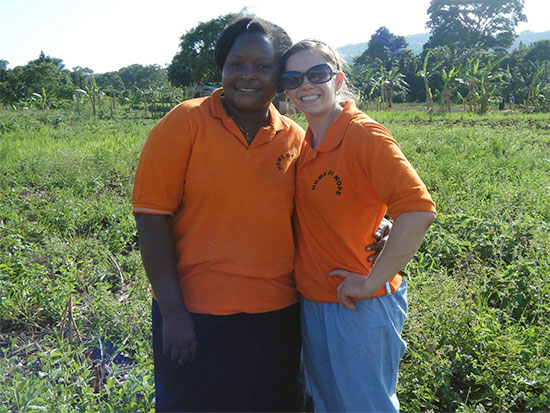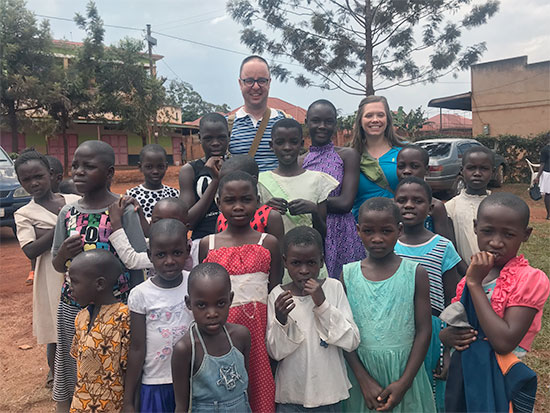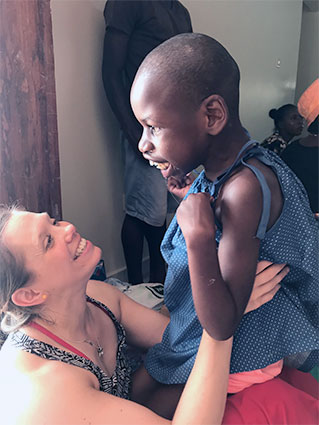 Edith Lukabwe, left, and Jenny Agricola met in Uganda on a mission trip in 2011.During a mission trip to Uganda in 2011, Jenny Agricola found her calling. Agricola, an occupational therapist at the Spain Rehabilitation Center at the University of Alabama at Birmingham, met Edith Lukabwe, the founder and director of Home of Hope, an orphanage that serves disabled children. After working with the children and Lukabwe, she knew she had to act.
Edith Lukabwe, left, and Jenny Agricola met in Uganda on a mission trip in 2011.During a mission trip to Uganda in 2011, Jenny Agricola found her calling. Agricola, an occupational therapist at the Spain Rehabilitation Center at the University of Alabama at Birmingham, met Edith Lukabwe, the founder and director of Home of Hope, an orphanage that serves disabled children. After working with the children and Lukabwe, she knew she had to act.
“I couldn’t forget what I saw,” Agricola said. “I felt like God had given me more than I would ever need. I believe to whom much is given, much is required. So, I took a leap of faith and said ‘I don’t know how I am going to do it or how I’m going to raise the funds, but I am going to partner with her and trust God to make a way.’”
When Agricola first met Lukabwe, she was 30 years old, caring for her five children, including her son Derrick, who was born with cerebral palsy, and 30 other orphans. Lukabwe opened her home to other children with disabilities after her own experience trying to find care for her son.
“In Uganda, if a child has a disability, it is typically looked upon as a curse, and there are no resources for help,” Agricola explained. “After going through that experience, she started taking in children with disabilities who had been abandoned by their parents due to their disability. In many cases, in order for the mother to remarry if the father leaves, she needs to not have a disabled child to care for, so it leaves the mothers with little option but to abandon their children.”
Seeing the work Lukabwe was doing, and also her lack of resources, Agricola formed Our Hope International to help support the orphanage. Since it began in 2011, the nonprofit has raised money to buy land, build a new house and build a second building to provide more space to care for more orphans. Today, 64 children live at Home of Hope, which is now registered as a non-governmental organization in Uganda.
 Jenny Agricola and her husband Corey Agricola, a chaplain at UAB, visit Uganda once a year with a team of other volunteers to bring supplies and help provide care to the children.“She has taken in children who had been left tied up in a house or abandoned on the side of the road,” Agricola said. “Now that Home of Hope has the status as a non-governmental agency, if the government finds a child who is at risk, they bring him or her to the orphanage.”
Jenny Agricola and her husband Corey Agricola, a chaplain at UAB, visit Uganda once a year with a team of other volunteers to bring supplies and help provide care to the children.“She has taken in children who had been left tied up in a house or abandoned on the side of the road,” Agricola said. “Now that Home of Hope has the status as a non-governmental agency, if the government finds a child who is at risk, they bring him or her to the orphanage.”
Through a child sponsorship program, each child has a bed with a mosquito net, blankets, clothes, medication, food, water and additional resources for care. The funding also goes toward running the facilities and paying for additional staff.
“We began a child sponsorship program where you can sponsor a child for $45 per month,” Agricola explained. “The money helps pay for clothes, food, medicine, clean water, occupational therapy, and the staff who are now on board at Home of Hope.”
They have bought cows and chickens to help sustain them, hired 20 staff members to help Lukabwe care for the children 24/7, and also brought a nurse and two occupational therapists on board. The specially trained staff have helped parents in the community care for their disabled children, who otherwise may have abandoned them.
“Every month, they do home visits to families where they know there is a child with a disability,” Agricola explained. “They check in on the family, ask them what they need, provide therapy and give the parents guidelines on what skills to work on with the child. The goal is to give them the things they need so they can keep their child and care for their child in their home.”
The funds have also raised money to send the children to school, something that would not have been an option without Our Hope International.
 Jenny Agricola, an occupational therapist at UAB, formed Our Hope International to support Home of Hope, an orphanage for children with disabilities in Uganda.“Our Hope has worked tirelessly to get school sponsors for the children at Home of Hope,” Lukabwe said. “Those children are now at school and are learning. Along with the education, they are helping them succeed in life. Every trip, they bring devices that help the children in their physical development, like wheelchairs and walkers that they customize to fit them. Some are now able to sit up in a wheelchair or walk with a walker. That wouldn’t have happened without them.”
Jenny Agricola, an occupational therapist at UAB, formed Our Hope International to support Home of Hope, an orphanage for children with disabilities in Uganda.“Our Hope has worked tirelessly to get school sponsors for the children at Home of Hope,” Lukabwe said. “Those children are now at school and are learning. Along with the education, they are helping them succeed in life. Every trip, they bring devices that help the children in their physical development, like wheelchairs and walkers that they customize to fit them. Some are now able to sit up in a wheelchair or walk with a walker. That wouldn’t have happened without them.”
Our Hope International takes a team of people to Uganda every summer, including Agricola; her husband, Corey Agricola, a chaplain at UAB; an occupational therapy professor at Alabama State University; and several occupational therapy students.
Agricola has seen the role Our Hope has played since its inception in the example of one young girl named Amina, whom she met in 2012.
“Amina is deaf and, at the time, did not know how to sign. She had no way to communicate,” Agricola said. “Because of the child sponsorship program, she now goes to school, she is fluent in sign language, and she is studying to get her beauty license to run her own business. To see her evolve from this little girl who was scared and couldn’t communicate to an ambitious young woman has been amazing. She had the desire to do more; she just needed the opportunity.”
To learn more about Our Hope International or how to sponsor a child, visit its website or email ourhopeinternational@gmail.com.